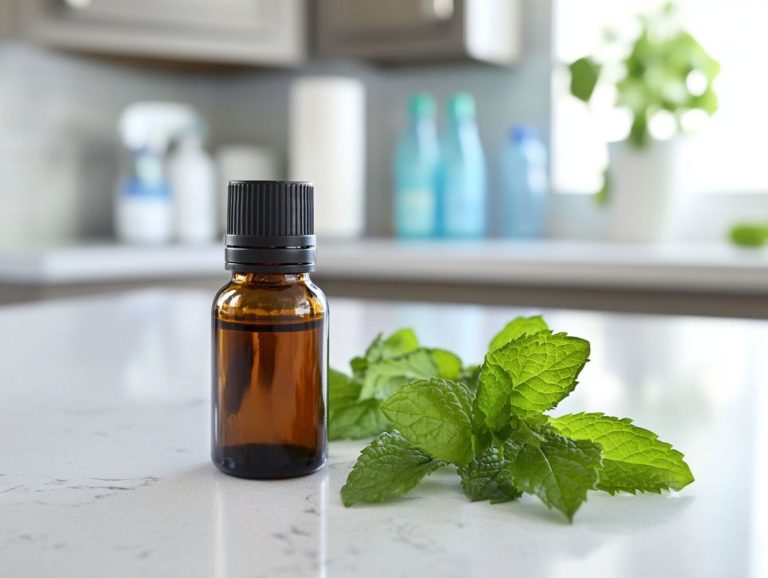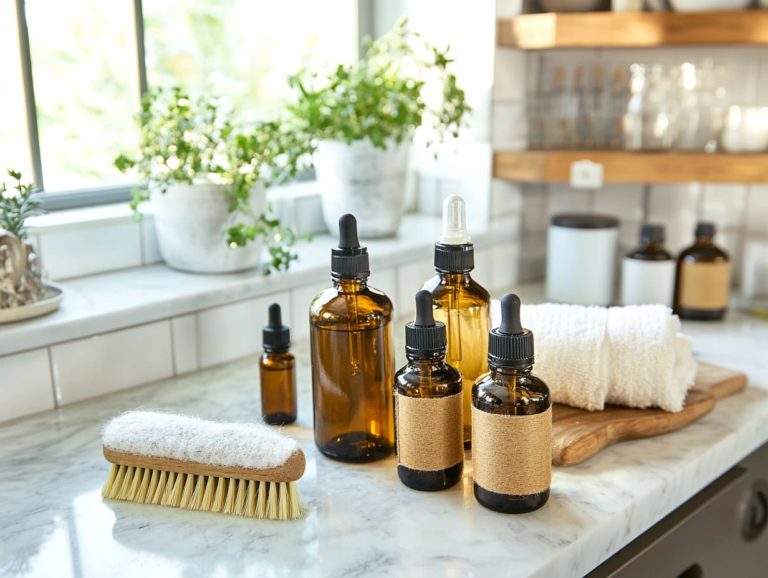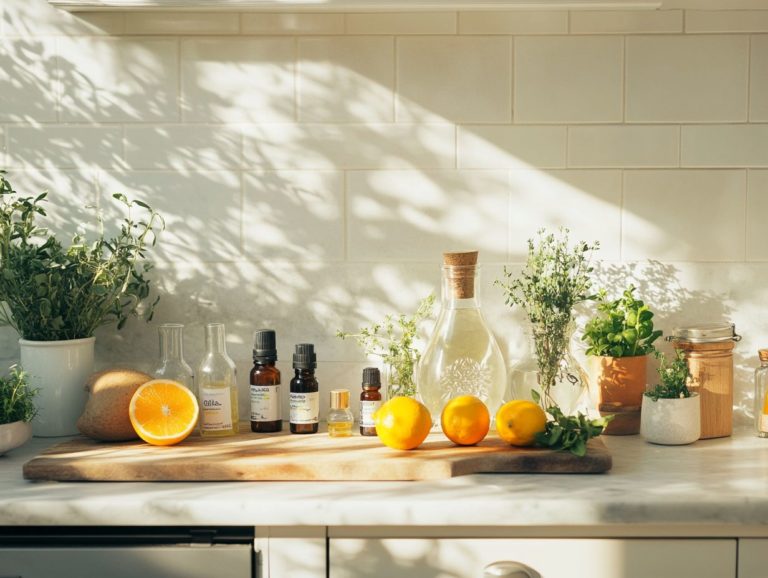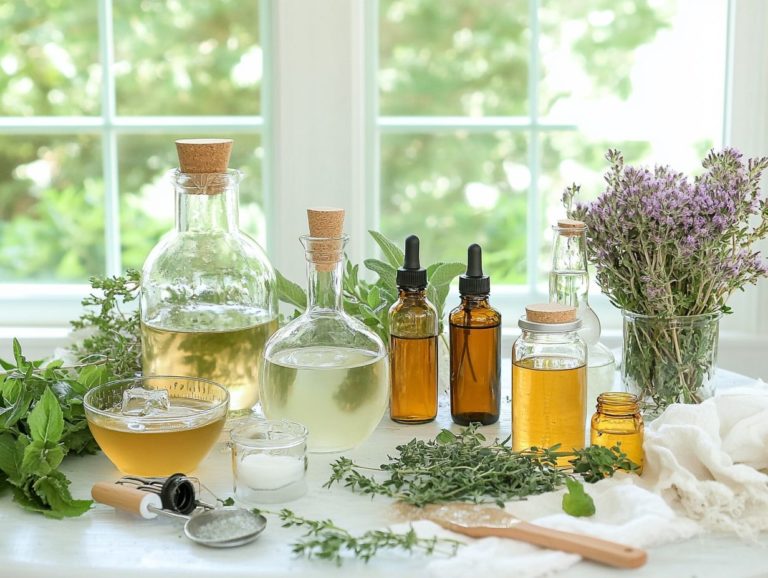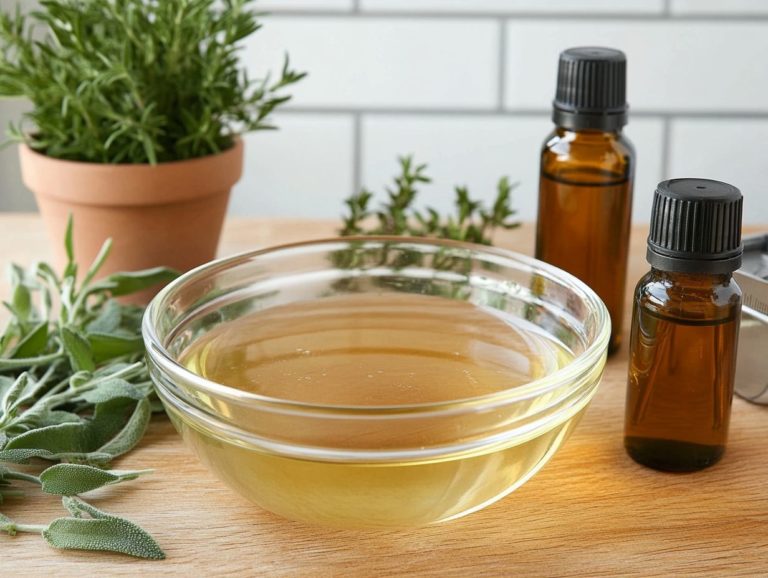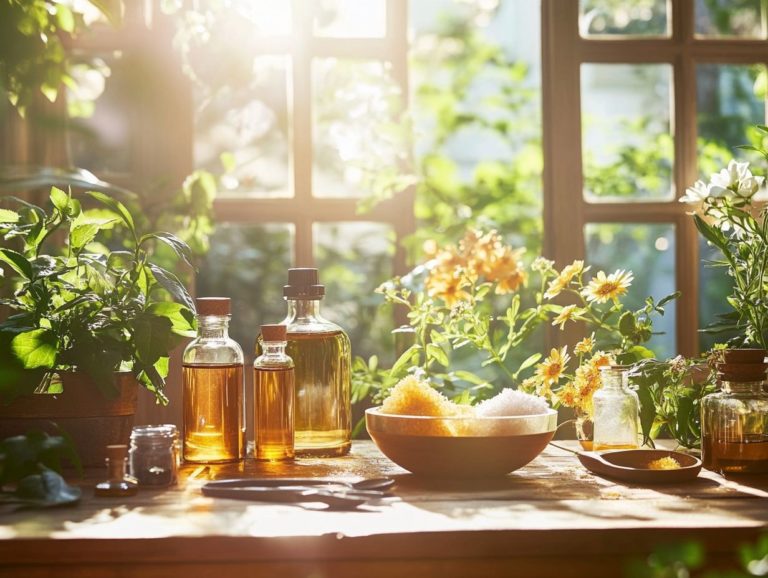5 Essential Oils to Tackle Tough Cleaning Jobs
Don t wait! Discover the remarkable natural power of essential oils and eco-friendly products in your cleaning routine.
Get ready to explore five amazing essential oils that will transform your cleaning routine while using sustainable materials.
Lemon cuts through grease easily, while lavender offers a soothing touch. These essential oils provide effective solutions for various cleaning challenges, including hard water stains and more.
You ll learn how to use them, explore their health benefits, and understand the necessary precautions for a safe and aromatic cleaning experience. Dive in to elevate your cleaning routine, possibly with some handy cleaning hacks!
Contents
- Key Takeaways:
- 1. Lemon Essential Oil for Greasy Surfaces
- 2. Tea Tree Essential Oil for Mold and Mildew.
- 3. Peppermint Essential Oil for Freshening Up the Air
- 4. Eucalyptus Essential Oil for Removing Sticky Residue
- 5. Lavender Essential Oil for Gentle Cleaning
- What Are Essential Oils and How Do They Work for Cleaning?
- How Can Essential Oils Be Used for Cleaning?
- What Are the Benefits of Using Essential Oils for Cleaning?
- Are There Any Risks or Precautions to Consider When Using Essential Oils for Cleaning?
- What Are Some Other Essential Oils That Can Be Used for Cleaning?
- Can Essential Oils Be Used for Cleaning in Place of Traditional Cleaning Products?
- Frequently Asked Questions
- 1. What are the 5 essential oils recommended for tackling tough cleaning jobs?
- 2. How does lemon essential oil help with cleaning?
- 3. Can tea tree essential oil really remove mold and mildew?
- 4. What makes peppermint essential oil a good cleaner?
- 5. Is lavender essential oil just for relaxing?
- 6. Can eucalyptus essential oil help with grease and grime?
Key Takeaways:
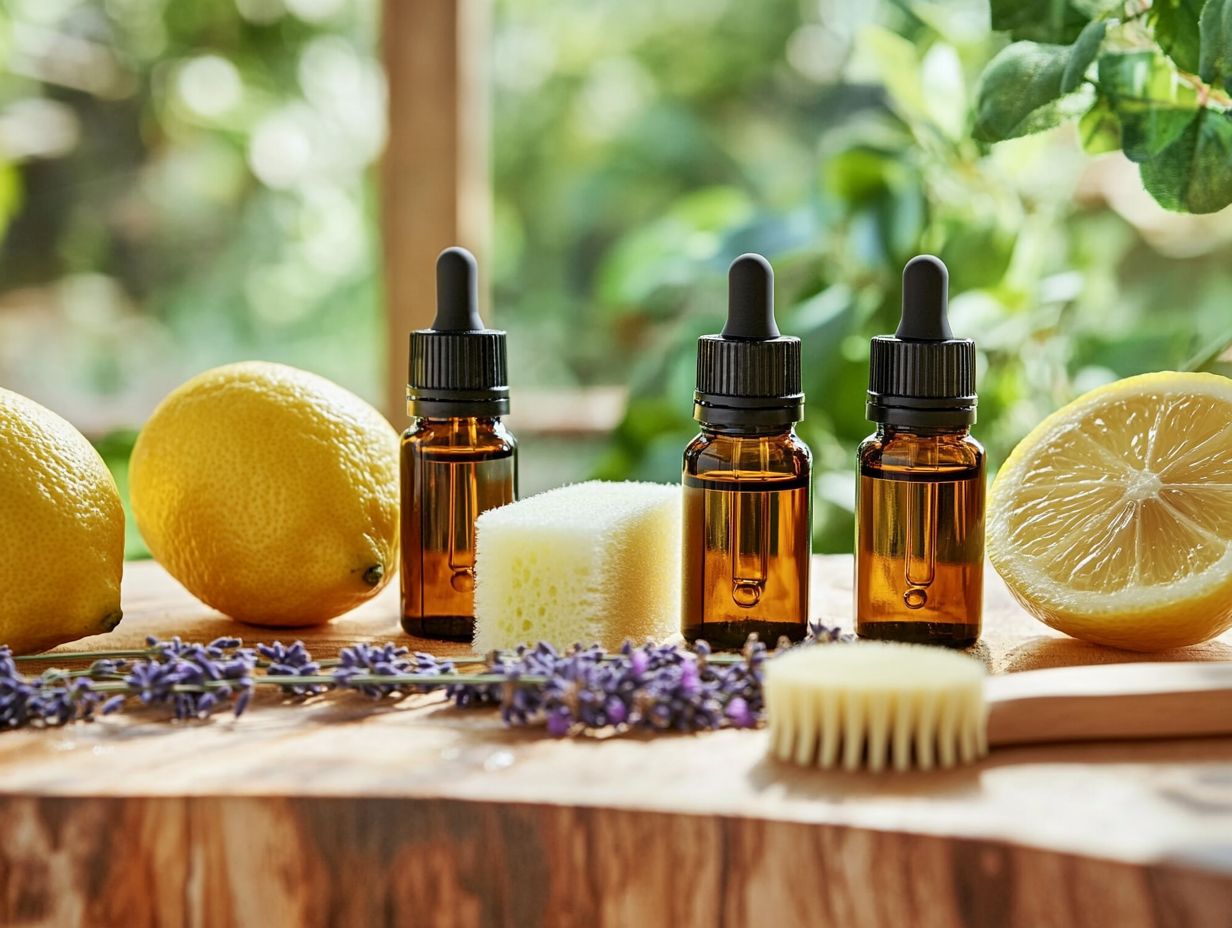
- Lemon essential oil cuts through grease and grime, making it a powerful tool for tough cleaning jobs in kitchens and bathrooms.
- Tea tree essential oil has germ-fighting abilities, making it great for removing mold and mildew from surfaces.
- Peppermint essential oil not only leaves a fresh scent but also helps purify the air and eliminate unpleasant odors in cleaning solutions.
1. Lemon Essential Oil for Greasy Surfaces
Lemon essential oil is not just a delightful burst of citrus fragrance; it s your go-to ally in natural cleaning, especially for tackling stubborn greasy surfaces around your home. It pairs well with eco-friendly tools like microfiber cloths.
With impressive germ-fighting abilities, this oil is key in eco-friendly cleaning solutions, helping you banish grime without harsh chemicals. Incorporating lemon essential oil into your routine elevates your indoor air quality while infusing your space with a refreshing ambiance.
To whip up a highly effective all-purpose cleaner, simply mix the following in a spray bottle:
- 1 cup of water
- 1 cup of white vinegar
- 10 drops of lemon essential oil
- 1 teaspoon of hydrogen peroxide (a common disinfectant)
This blend tackles tough stains while leaving a delightful aroma. For a more concentrated solution, blend:
- 2 tablespoons of baking soda
- 1/4 cup of water
- 5 drops of lemon essential oil
This creates a scrubbing paste that works wonders on surfaces. For best results, use it with a microfiber cloth.
Unlike traditional cleaners laden with synthetic fragrances and preservatives, lemon essential oil provides a chemical-free alternative, fostering a healthier home environment. Its natural degreasing properties effortlessly break down oil and grease, making chores easier and more efficient.
2. Tea Tree Essential Oil for Mold and Mildew.
Tea tree oil is celebrated for its remarkable germ-fighting ability, positioning it as an outstanding natural cleaning agent for tackling mold and mildew around your home. Choosing this eco-friendly alternative effectively addresses these stubborn issues without relying on harsh chemicals that could compromise your indoor air quality.
Incorporating tea tree oil into your cleaning routine not only eradicates unsightly mold but also enhances the overall ambiance with a refreshing scent.
To create an effective homemade cleaner, combine about one teaspoon of tea tree oil with two cups of water in a spray bottle. Remember to shake well before each use to ensure even distribution. This simple ratio strikes the perfect balance to combat mold while remaining safe for most surfaces, including walls, tiles, and countertops.
One standout advantage of tea tree oil over conventional mold removers is its natural origin, significantly lessening your environmental footprint and promoting a healthier living environment. By repurposing empty spray containers for this eco-friendly solution, you can embrace waste reduction while keeping your home clean and inviting.
3. Peppermint Essential Oil for Freshening Up the Air
Peppermint essential oil is not just any cleaning agent; it s a delightful and invigorating powerhouse that can transform your home while offering many health benefits. Its refreshing aroma effectively banishes unpleasant odors and enhances indoor air quality, making it an essential addition to your eco-friendly cleaning toolkit.
By incorporating peppermint oil into your cleaning routine, you’ll elevate the freshness of your living space and cultivate a welcome atmosphere all without resorting to harmful chemicals. It s a game changer for a clean home!
You might wonder how to harness this essential oil for maximum effect. There are several effective methods to elevate your cleaning regimen. From using it with other natural cleaning agents to incorporating it into homemade cleaners, the options are plenty.
For instance, a simple blend of peppermint oil and water can create a natural air freshener that revitalizes any room in an instant. Alternatively, adding a few drops to a diffuser fills your space with its delightful scent while promoting a sense of calmness and clarity.
Combine peppermint oil with natural ingredients like vinegar or baking soda for even better results. This amplifies its cleaning prowess, making it an excellent choice for tackling stubborn stains or grease. The invigorating fragrance stimulates your senses, contributing to a more productive cleaning experience and leaving your spaces smelling crisp and rejuvenated.
4. Eucalyptus Essential Oil for Removing Sticky Residue
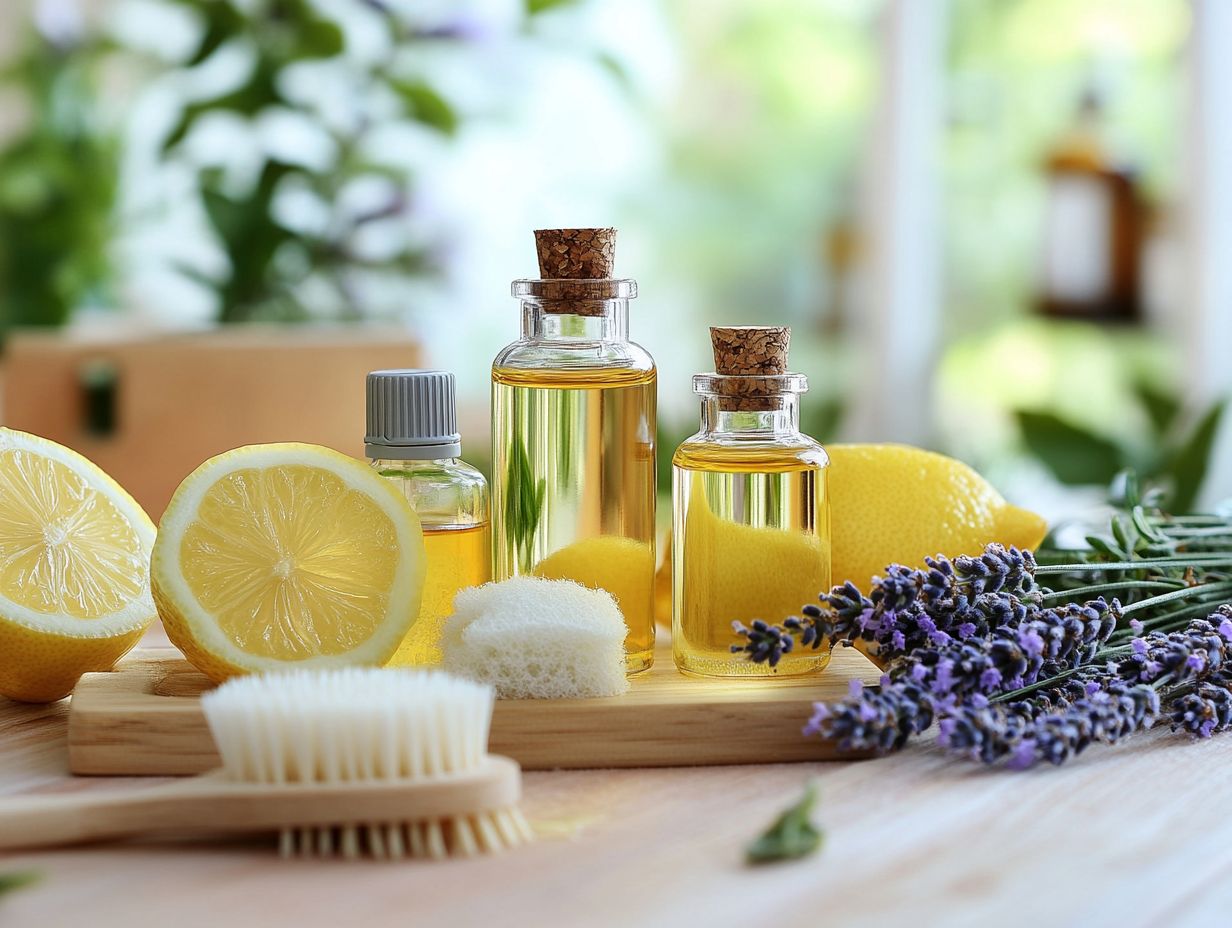
Eucalyptus essential oil stands out as a versatile natural cleaning agent, expertly designed to tackle sticky residue across various surfaces, ensuring a thorough, eco-friendly clean. Its gentle abrasiveness means you can clean effectively without risking damage to your surfaces, making it a top choice for discerning households.
By incorporating eucalyptus oil into your cleaning recipes, you elevate your cleaning game while fostering a healthier indoor environment free from harmful chemicals.
This remarkable essential oil also contains substances that kill germs, enhancing the cleanliness and safety of your home. For countertops and kitchen surfaces, a simple blend of eucalyptus oil with distilled white vinegar works wonders against tough grime while leaving behind a refreshing fragrance.
If you re faced with adhesive marks on windows or furniture, adding a few drops of eucalyptus oil to warm water creates a powerful solution that can compete with traditional sticky residue removers minus the toxic exposure.
As the eco-conscious movement continues to gain momentum, many have realized that embracing such natural alternatives leads to effective cleaning and aligns beautifully with sustainable practices. Join the movement towards natural cleaning try Simply Earth products today!
5. Lavender Essential Oil for Gentle Cleaning
Lavender essential oil is celebrated not just for its calming aroma but also for its remarkable effectiveness in natural cleaning. It offers a gentle yet powerful solution for various household messes, perfect for dusting surfaces and keeping your home smelling fresh.
Known for its soothing properties and health benefits, lavender oil can elevate your eco-friendly cleaning routine by providing both cleanliness and a refreshing scent. Integrate lavender essential oil into your cleaning products. This way, you can maintain a peaceful atmosphere while tackling everyday dirt and grime efficiently.
Imagine creating an all-purpose cleaner that effortlessly wipes down surfaces! You can even incorporate it into your laundry detergents to add a delightful fragrance. Use it to deep clean your household items and improve your overall cleaning effectiveness.
The versatility of this oil is truly limitless. For a simple all-purpose cleaner, just combine:
- one cup of distilled water,
- half a cup of white vinegar,
- and 10-15 drops of lavender essential oil.
Mix these ingredients in a spray bottle for a natural and effective cleansing solution.
With its antibacterial properties, lavender oil disinfects while its aromatic qualities help alleviate stress, fostering a more serene home environment. By choosing lavender oil-based cleaning solutions, you not only promote a more sustainable lifestyle but also contribute to a healthier living space, free from harsh chemicals.
What Are Essential Oils and How Do They Work for Cleaning?
Essential oils are concentrated plant extracts that capture the natural aroma and properties of their sources. They are perfect for eco-friendly cleaning solutions that boost effectiveness while promoting health benefits. These oils, derived from various plants, possess unique attributes that tackle different cleaning tasks, providing you with an organic alternative to traditional cleaning products.
By understanding how essential oils function in cleaning, you can harness their power to create a healthier indoor environment. This minimizes waste and harmful chemicals in your home. They are versatile cleaning agents, ideal for use with reusable spray bottles and other eco-friendly tools.
Extracted using techniques like boiling with steam or pressing fresh plants, essential oils preserve the integrity of the plant’s beneficial compounds. These organic ingredients ensure your cleaning products are both effective and safe.
Essential oils possess antibacterial, antifungal, and antiviral properties, making them exceptionally effective for cleaning. For example, tea tree oil is celebrated for its potent antiseptic qualities, making it an excellent choice for disinfecting surfaces. Meanwhile, lemon oil serves as a natural degreaser and stain remover.
Incorporating these organic ingredients reduces your exposure to toxic substances and supports eco-sustainability. Oils like lavender cleanse while infusing your spaces with calming aromas. This transforms the cleaning process into a holistic, health-promoting experience while promoting health benefits.
How Can Essential Oils Be Used for Cleaning?
Incorporating essential oils into your cleaning routine opens up a world of possibilities. You can craft homemade cleaners, create all-purpose sprays, and enhance your steam cleaning methods.
This approach is a remarkable way to embrace an eco-friendly and natural alternative to conventional cleaning products. Their versatility allows you to use them for dusting surfaces, disinfecting spaces, and tackling everyday messes with ease.
By exploring various cleaning methods that harness the power of essential oils, you can elevate both the effectiveness and sustainability of your cleaning regimen.
For example, when you combine 1 cup of distilled water with 1 tablespoon of white vinegar and add 10 drops of tea tree essential oil, you create a strong cleaning spray that effectively wipes out germs and odors. Want extra cleaning power? Just add hydrogen peroxide! Or consider a simple blend of 1 cup of baking soda mixed with a few drops of lavender essential oil this concoction transforms into an excellent carpet freshener.
Opting for essential oils not only promotes a healthier home environment but also minimizes your exposure to harsh chemicals commonly found in many commercial products. Think of cleaning hacks, like using lemon oil to banish sticky residues or eucalyptus oil to refresh your laundry, showcasing just how powerful these 5 essential oils for homemade cleaning solutions can be in your daily cleaning tasks.
What Are the Benefits of Using Essential Oils for Cleaning?
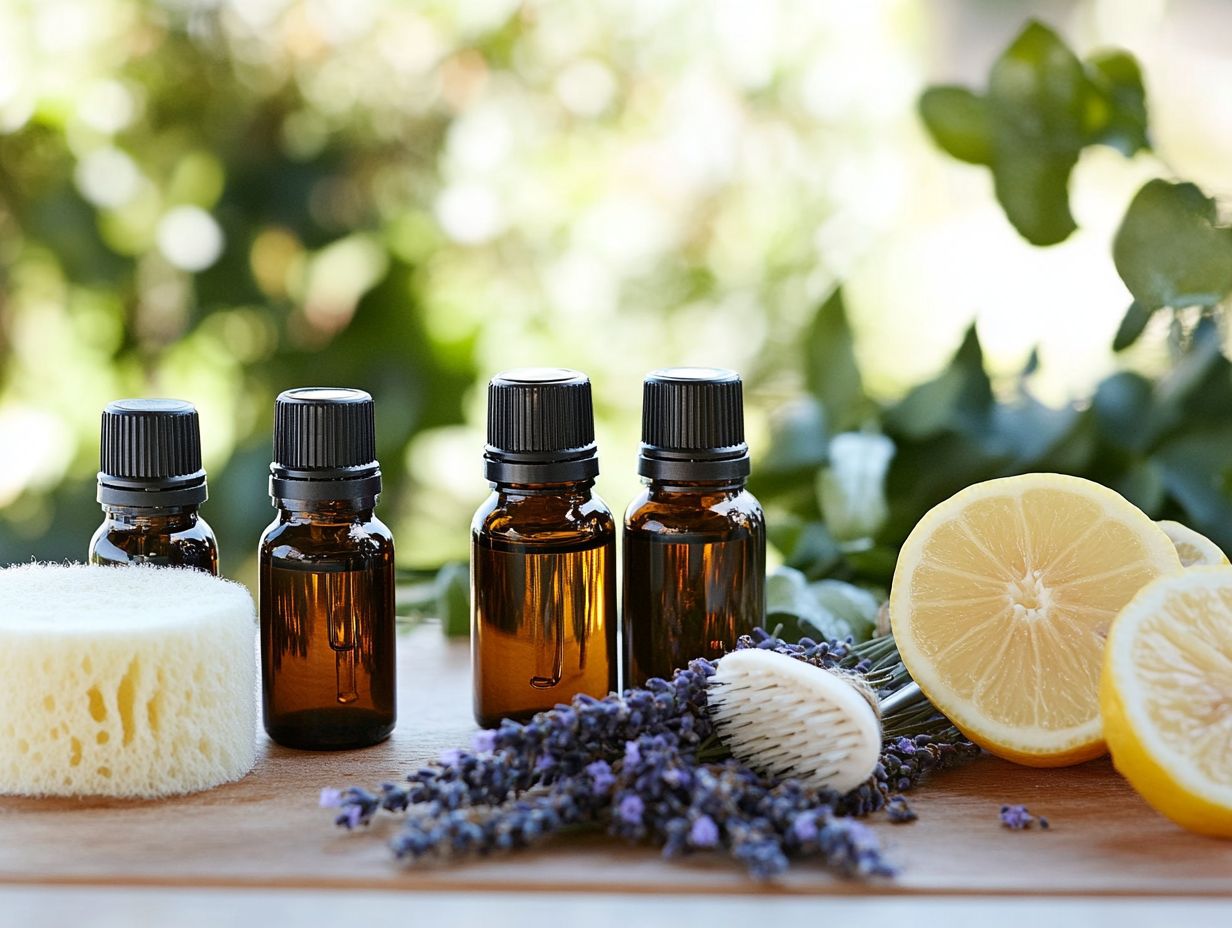
Using essential oils for cleaning offers you a plethora of benefits, including:
- Enhanced indoor air quality
- Reduced exposure to harmful chemicals
- Powerful antimicrobial properties for effective cleaning and disinfection
These natural alternatives do more than just promote your health and well-being; they also contribute to waste reduction by allowing you to create reusable spray bottles and homemade cleaners. By making the switch to essential oils, you can transform your home into a safer, more sustainable sanctuary and reduce your carbon footprint.
The versatility of essential oils is particularly enticing, as each type boasts unique characteristics tailored to specific cleaning needs. For instance:
- Tea Tree Oil: Great for mold and mildew.
- Lavender Oil: Refreshes linens and keeps pests at bay.
- Citrus Oils: Excellent degreasers with a fresh scent.
By harnessing these gifts of nature, you can maintain a pristine home environment while prioritizing both your health and the well-being of our planet.
Are There Any Risks or Precautions to Consider When Using Essential Oils for Cleaning?
While essential oils are generally safe and effective for natural cleaning, there are important risks and precautions worth considering to ensure their safe use in your home. Some essential oils can cause skin irritation if not properly diluted, and certain oils may not be suitable around pets or small children. By understanding these precautions, you can fully enjoy the benefits of essential oils while minimizing any potential risks.
When selecting essential oils, it’s essential to consider the specific needs of your household. For instance, lavender and chamomile are often chosen for their calming properties, making them perfect for homes with children. Conversely, oils like peppermint can be quite stimulating and might not be the best choice for bedtime routines.
Proper dilution is critical; a typical ratio of 1-2% essential oil to carrier oil (a neutral oil used to dilute essential oils before applying them to the skin) is advisable for topical applications. Good ventilation during use helps prevent overwhelming scents, which can pose challenges for sensitive children or pets. Always consult safety guidelines regarding specific oils, as some, like tea tree or eucalyptus, can be toxic to certain animals. This approach will help you maintain a harmonious and safe home environment.
What Are Some Other Essential Oils That Can Be Used for Cleaning?
In addition to lemon and tea tree oil, you can also explore essential oils like peppermint, eucalyptus, and lavender. These oils elevate your natural cleaning routine, each bringing its own unique benefits and delightful fragrances that enhance your eco-friendly efforts.
Sweet orange, rosemary, and cinnamon fill your home with delightful scents. They also clean effectively, helping to address various household messes and contributing to a healthier living environment with their natural cleaning properties.
Take sweet orange, for example. Its remarkable ability to cut through greasy residues makes it perfect for kitchen surfaces. Meanwhile, rosemary offers an invigorating aroma and antibacterial properties, which are incredibly beneficial in bathrooms. Cinnamon not only brings a warm, comforting fragrance but also boasts potent antimicrobial properties, making it a fantastic choice for disinfecting.
When you blend these oils together, you create a refreshing mixture that not only cleans effectively but also lifts your spirits. This transforms mundane cleaning tasks into a delightful ritual. Each scent complements the others beautifully, resulting in a harmonious aroma that leaves your space smelling absolutely divine, with the added health benefits of fresh air.
Can Essential Oils Be Used for Cleaning in Place of Traditional Cleaning Products?
Yes! Transform your cleaning routine with essential oils they’re a fantastic substitute for traditional cleaning products. By choosing a more eco-friendly way to keep your home spotless, you embrace their natural cleaning properties, which effectively disinfect and eliminate dirt without the harmful chemicals typically found in commercial cleaners.
Incorporating essential oils into your cleaning routine enhances cleaning effectiveness and fosters a healthier environment both inside and outside your home.
Consider alternatives like tea tree oil, renowned for its strong antibacterial qualities. It tackles pesky germs that thrive on surfaces with remarkable efficiency. In contrast, vinegar and commercial disinfectants can irritate your skin and lungs due to their harsh chemical compositions.
Citrus oils, such as lemon, do more than just cut through grease; they leave behind a refreshing scent that improves air quality instead of merely masking unpleasant odors. Embracing natural cleaning agents minimizes your exposure to potentially hazardous substances and reduces plastic waste associated with store-bought cleaners, promoting a more sustainable lifestyle.
Frequently Asked Questions
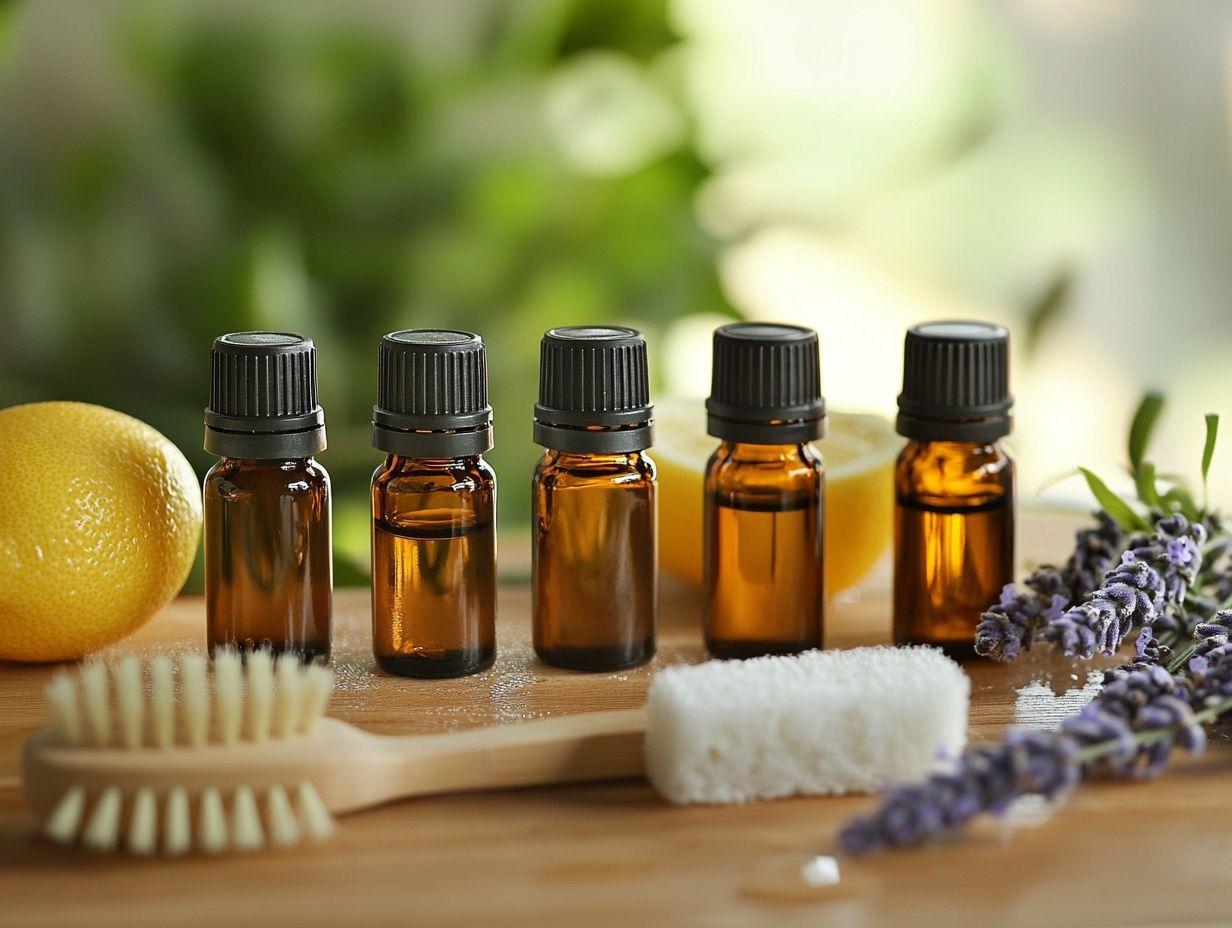
1. What are the 5 essential oils recommended for tackling tough cleaning jobs?
The 5 essential oils that are best for tough cleaning jobs are lemon essential oil, tea tree, peppermint, lavender, and eucalyptus.
2. How does lemon essential oil help with cleaning?
Lemon essential oil is known for its antibacterial and antiseptic properties, making it effective for disinfecting and deodorizing surfaces.
3. Can tea tree essential oil really remove mold and mildew?
Yes, tea tree essential oil has powerful antifungal properties that make it great for removing mold and mildew from surfaces.
4. What makes peppermint essential oil a good cleaner?
Peppermint essential oil has a refreshing scent and contains menthol, which has natural antimicrobial and antiviral properties. This makes it a great all-purpose cleaner.
5. Is lavender essential oil just for relaxing?
No, lavender essential oil is also great for cleaning and has antibacterial and antiviral properties that make it perfect for tackling tough cleaning jobs.
6. Can eucalyptus essential oil help with grease and grime?
Yes, eucalyptus essential oil has strong cleansing properties that can cut through grease and grime, making it an excellent addition to your cleaning routine.
Start your eco-friendly cleaning journey today with these essential oils!

